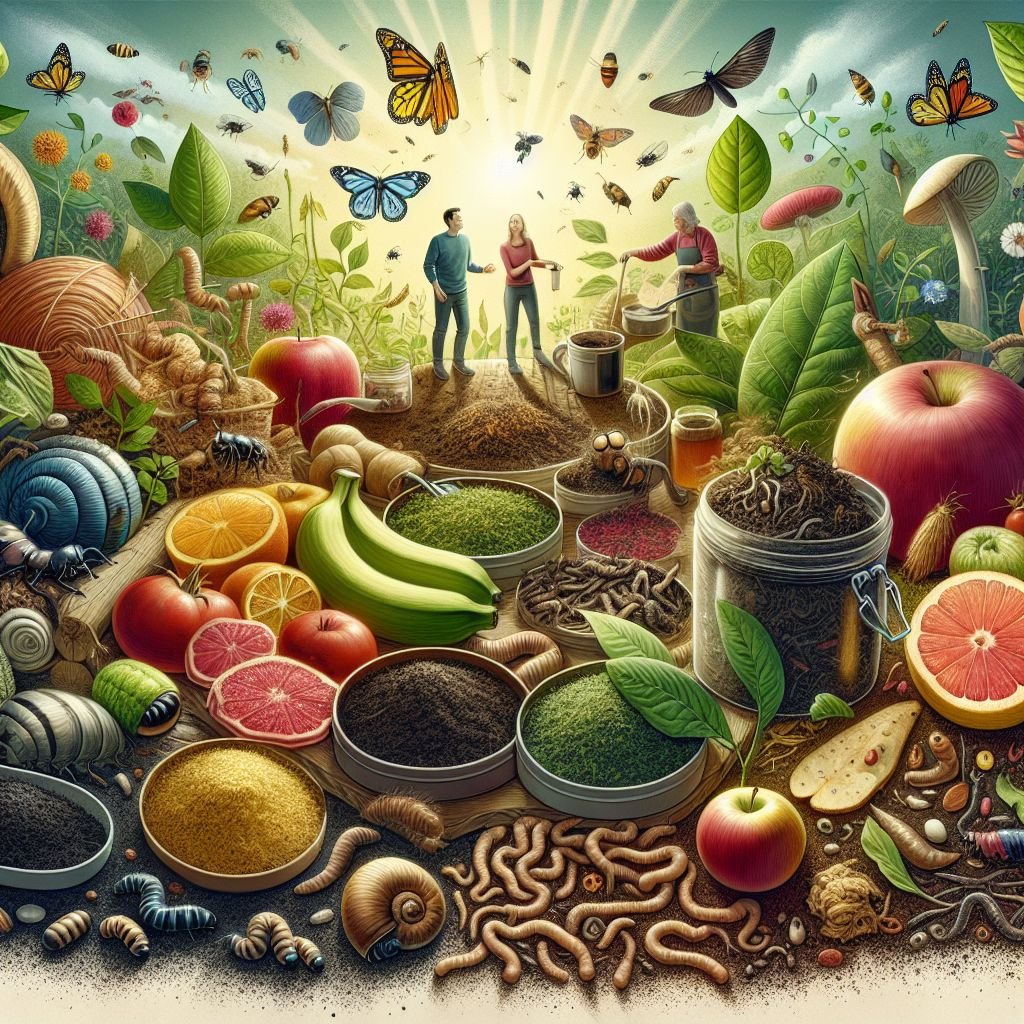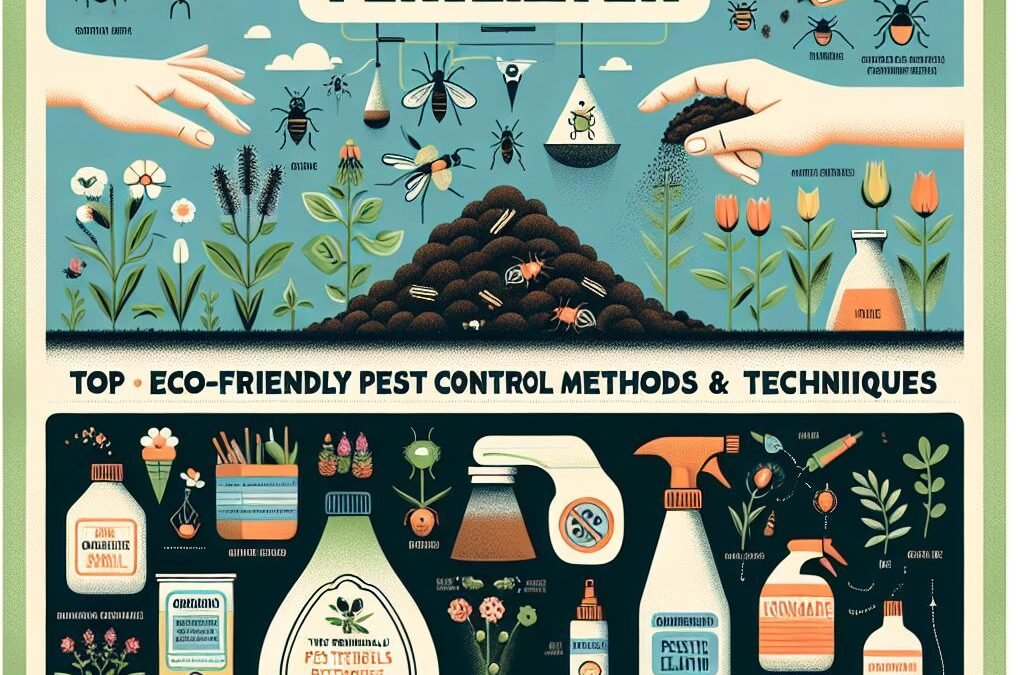Key Takeaways
- Discover the power of composting to enhance soil health and deter pests.
- Learn how essential oils can act as a natural barrier against garden invaders.
- Explore the benefits of neem oil, a versatile organic pesticide and fungicide.
- Get recipes for homemade pest control solutions that are safe and effective.
- Understand the importance of timing and method when applying organic fertilizers for pest control.
Natural Ingredients for a Thriving Garden

Composting: Turning Waste into Pest-repelling Gold
Composting is more than just a way to recycle kitchen scraps and yard waste; it’s a critical step in creating a balanced ecosystem in your garden. When you compost, you’re doing two things: enriching the soil with vital nutrients and creating an environment that’s less appealing to common garden pests.
Here’s why compost is so powerful:
- Nutrient-Rich Soil: Compost adds essential nutrients back into the soil, which helps plants grow strong and healthy. Strong plants are better equipped to resist pests.
- Beneficial Microorganisms: The decomposition process in composting encourages beneficial bacteria and fungi to thrive. These microorganisms can outcompete or even consume pest larvae.
Starting a compost pile is easy:
- Choose a spot in your yard that’s convenient but out of the way.
- Mix green waste, like vegetable scraps, with brown waste, such as dry leaves or newspaper.
- Keep the pile moist and turn it regularly to speed up the decomposition process.
Most importantly, remember that composting is a patient gardener’s game. It might take a few months to get your first batch of compost, but the wait is absolutely worth it.
Essential Oil Magic: Aromatic Barriers to Deter Critters
Essential oils are not just for spa days—they’re a secret weapon in the gardener’s toolkit. These concentrated plant essences can repel a variety of pests with their strong scents. For example, peppermint oil is known to deter ants and spiders, while rosemary oil can help keep mosquitoes at bay.
Here’s a simple way to use essential oils in your garden:
- Mix a few drops of essential oil with water and a bit of mild, eco-friendly soap to help it stick.
- Fill a spray bottle with this mixture and apply it to the leaves of plants that are prone to pests.
- Reapply every few days, especially after rain, for best results.
Remember, essential oils are potent. Always test a small area first to ensure they don’t harm your plants. For more information on eco-friendly gardening, check out our ultimate guide to yard maintenance and cleanup.
Neem Oil: The Organic Gardener’s Best Friend
Neem oil, derived from the seeds of the neem tree, is a powerful organic option for pest control. It works by disrupting the life cycle of pests, preventing them from feeding, maturing, and reproducing. This makes it effective against a wide range of pests, from aphids to mites.
But neem oil isn’t just a pesticide—it’s also a fungicide. It can help prevent powdery mildew and other fungal diseases that often accompany pest infestations.
To use neem oil effectively:
- Mix neem oil with water and a little bit of mild, eco-friendly dish soap.
- Spray the mixture onto affected plants, covering all surfaces, including the undersides of leaves.
- Apply in the evening to avoid burning the plants and to maximize the oil’s effectiveness as pests are more active at night.
Because neem oil is safe for beneficial insects like bees and ladybugs when used correctly, it’s a cornerstone of eco-friendly pest control.
Certainly! Here’s a table summarizing the natural ingredients and their benefits for gardening:
| Natural Ingredient | Benefits |
|---|---|
| Wood Ash | Alkaline wood ash neutralizes acidic soil. Use it cautiously when cool to avoid harming soil microorganisms. |
| Aspirin | Contains salicylic acid, boosting plant immunity and preventing fungal diseases. Extends the lifespan of cut plants and flowers. |
| Leftover Fruits & Vegetables | Nutrient-rich peels from kitchen scraps benefit plants like tomatoes, rosebushes, peppers, and flowering plants. |
| Vinegar | Use as an herbicide. A solution of white vinegar (10% or 20%) mixed with salt, lemon juice, and dish soap can be sprayed on plants. |
| Carbonated Water | Provides essential CO2 for photosynthesis, promoting rapid growth and greener plants. Contains beneficial macronutrients. |
| Coffee Grounds | Rich in nitrogen, improves soil structure, and deters pests like slugs and snails. |
| Eggshells | Adds calcium to the soil, benefiting plants like tomatoes and peppers. Helps prevent blossom end rot. |
| Used Teabags/Leaves | Contributes tannins and nitrogen. Bury them in soil or use as mulch. |
| Grass Clippings | Use as mulch to retain moisture, suppress weeds, and release nitrogen during decomposition. |
| Compost Tea | Steeped compost in water provides a nutrient-rich liquid fertilizer, enhancing soil health and supporting plant growth. |
Feel free to explore these natural ingredients to nurture your garden! 🌱🌼
DIY pest control mixes to help you keep those pesky critters at bay:

For Roaches:
Borax and Sugar Mixture:
Mix equal parts of borax and sugar.
Apply the powder along baseboards, in cracks, and under sinks.
When roaches ingest the mixture, the borax damages their digestive system and outer skeleton, ultimately killing them.
Be cautious, as borax is slightly toxic. Keep it away from children, pets, and food prep areas¹.
Coffee Grounds Trap:
Fill a jar with one cup of water and two tablespoons of dry coffee grounds.
Line the edge of the jar with petroleum jelly.
Roaches will climb in to get the coffee grounds but won’t be able to climb back out¹.
For Ants:
Homemade Ant Repellent:
Mix equal parts of water and white vinegar.
Spray this solution directly on ants.
Wipe up dead ants with a wet paper towel after a few minutes.
Attract Ants with Boric Acid:
Create a mixture of one part corn syrup and one part boric acid.
Spread this mixture on a piece of paper and wait for ants to eat it.
Keep boric acid away from children, pets, and food prep areas¹.
Baking Soda and Sugar Mixture:
Mix three parts baking soda and seven parts sugar.
Leave the mixture in small containers for ants to eat and take back to their nests. It will react in their digestive system and kill them¹.
For Other Pests:
Insecticidal Soap:
Mix 5 tablespoons of liquid soap or Castile soap with a gallon of water.
Spray it on pests like whiteflies, aphids, mealy bugs, scale insects, and thrips².
Oil Sprays:
Use a mixture of onehalf cup rubbing alcohol and 1 quart of liquid soap to control pests².
Diatomaceous Earth:
Sprinkle diatomaceous earth around plants to deter crawling insects.
Garlic Spray:
Blend garlic cloves with water and spray it on plants to repel pests³.
Remember to use these solutions carefully and follow safety precautions. Happy pest control! 🐜🌿
From Tiny Seeds: Cultivating an Eco-Friendly Mindset

Adopting eco-friendly pest control methods isn’t just about the actions you take; it’s about the mindset you cultivate. It starts with understanding that every element in your garden, from the tiniest microorganism to the largest plant, plays a part in the overall health of your ecosystem. This holistic approach is key to sustainable gardening.
Encouraging Beneficial Insects to Make Homes in Your Garden
Beneficial insects are nature’s answer to pest control. Ladybugs feast on aphids, bees pollinate your plants, and predatory wasps take care of caterpillars. Attracting these helpful critters is an essential step in maintaining a balanced garden.
Planting a variety of flowering plants is a simple way to invite beneficial insects. They’re attracted to flowers for both nectar and pollen. Including plants like marigolds, sunflowers, and lavender can create a welcoming habitat for these insects.
Another technique is to provide shelter. Leaving a small pile of leaves or a dead log in your garden can offer a safe haven for insects to thrive and work their magic against pests.
- Plant a variety of flowers that bloom at different times of the year to ensure a consistent food source.
- Consider installing an insect hotel, which provides a variety of habitats for different species.
- Avoid using broad-spectrum pesticides that kill beneficial insects along with the pests.
Making Room for All: Biodiversity as a Natural Pest Deterrent
Biodiversity isn’t just a buzzword—it’s a practical strategy for pest control. A diverse garden with a mix of plants, insects, birds, and other wildlife creates a dynamic environment that’s resilient to infestations. Pests are less likely to take over when there’s a complex web of predators and prey.
Growing Green: Harnessing the Power of Organic Fertilizers

Organic fertilizers are a cornerstone of eco-friendly pest control. They feed the soil, which in turn feeds the plants. Healthy plants with strong immune systems are naturally more resistant to pests and diseases.
There are many types of organic fertilizers available, including bone meal, blood meal, fish emulsion, and seaweed extracts. Each has its own set of benefits and ideal use cases. Some release nutrients quickly, while others do so slowly over time, providing a steady source of nourishment for your plants.
Why Organic Fertilizers Outshine Chemical Alternatives
Organic fertilizers have several advantages over their chemical counterparts. They’re made from natural materials, so they improve soil structure, enhance water retention, and increase the biodiversity of soil organisms—all of which lead to healthier plants and a more productive garden.
Chemical fertilizers, on the other hand, can harm the soil and the beneficial organisms within it. They often provide a quick fix but at the expense of long-term soil health. Additionally, the runoff from synthetic fertilizers can contaminate local waterways, causing environmental harm.
Here’s why you should opt for organic fertilizers:
- They release nutrients at a pace that matches plant needs, reducing the risk of over-fertilization and pest outbreaks associated with lush, but weak, growth.
- Organic fertilizers improve soil health over time, leading to a sustainable and resilient garden ecosystem.
- They are less likely to cause harm to beneficial insects and wildlife, as well as to pets and humans.
By choosing organic fertilizers, you’re investing in the long-term health of your garden and the environment.
Eco-Friendly Approaches to Protect Your Plants and Planet
Eco-friendly pest control is about more than just avoiding chemicals. It’s about adopting practices that protect and nurture your plants while preserving the health of our planet. By choosing organic fertilizers and natural pest control methods, you’re contributing to a more sustainable future.
Beneath the Leaves: Understanding Pest Dynamics

Understanding the behavior and life cycles of common garden pests is crucial for effective control. Once you know what you’re dealing with, you can tailor your organic pest control strategies to be more effective.
Identifying Common Garden Pests
Some of the most common garden pests include aphids, slugs, snails, and caterpillars. These creatures can do a lot of damage quickly, but they also have natural enemies that can keep their populations in check.
Identifying pests early is critical. Regularly inspect your plants for signs of damage, and learn to recognize the appearance of common pests. This knowledge allows you to act swiftly and use targeted organic control methods before an infestation gets out of hand.
The Role of Soil Health in Pest Prevention
Soil is the foundation of your garden, and its health is directly linked to pest prevention. Healthy soil supports robust plant growth, which in turn can ward off pests. It’s a simple equation: the healthier your soil, the healthier your plants, and the less likely they are to succumb to pests.
Good soil health can be achieved by incorporating organic matter, maintaining proper pH levels, and fostering a thriving community of soil organisms. These practices encourage a balanced ecosystem that naturally regulates pest populations. So, before reaching for any pest control solution, always consider the soil first—it might just be the key to your problem.
Frequently Asked Questions :
Let’s address some common questions gardeners have when it comes to organic fertilizers and eco-friendly pest control.
What are the top organic fertilizers for pest control?
The top organic fertilizers for pest control are those that not only nourish plants but also create an environment that’s unfavorable for pests. Some of the best options include compost, worm castings, fish emulsion, and seaweed extracts. These fertilizers provide a wide range of nutrients and support soil health, which, in turn, helps plants resist pests naturally.
How often should I apply organic fertilizers for pest control?
Organic fertilizers should be applied based on the needs of your plants and the specific product you’re using. Generally, a light application of compost can be made in the spring and fall. Liquid fertilizers like fish emulsion might be applied every two to four weeks during the growing season. Always follow the instructions on the product label and observe your plants’ response to determine the best application frequency.
Can organic fertilizers harm beneficial insects?
Most organic fertilizers are safe for beneficial insects when used as directed. In fact, they can help create a more inviting environment for these helpful creatures. However, certain organic pesticides, such as those containing pyrethrins, should be used with caution, as they can affect beneficial insects. Always research and choose products that are targeted and least impactful on non-pest species.
What pests can be controlled with organic fertilizers?
While organic fertilizers are primarily used to nourish plants, they can indirectly help control pests such as aphids, whiteflies, and certain beetles by boosting plant health. However, for direct pest control, you might need to use specific organic pesticides like neem oil, diatomaceous earth, or insecticidal soaps, which target a broader range of pests.
How do I make organic pest control fertilizer at home?
- For a simple homemade pest deterrent, mix 1 tablespoon of mild liquid soap with a gallon of water. This can help control soft-bodied insects like aphids and spider mites.
- To create a garlic spray, blend two whole garlic bulbs (not just cloves) with a small amount of water, let it sit overnight, and then strain it into a quart jar. Add a half cup of vegetable oil, a teaspoon of mild liquid soap, and enough water to fill the jar. To use, dilute 1 cup of this mixture with a gallon of water.
- Chili pepper spray can be effective against a variety of pests. Blend a couple of hot peppers with a cup of water, strain the mixture, and add a tablespoon of liquid soap. Spray this solution on the foliage of plants that are under attack.
Remember, the key to successful organic gardening is to work with nature, not against it. By understanding the role of each component in your garden’s ecosystem and employing these eco-friendly pest control methods, you’ll be able to grow a healthy, thriving garden that’s in harmony with the environment.
Embrace these eco-friendly lawn maintenance techniques and watch your garden flourish naturally. Happy gardening!

